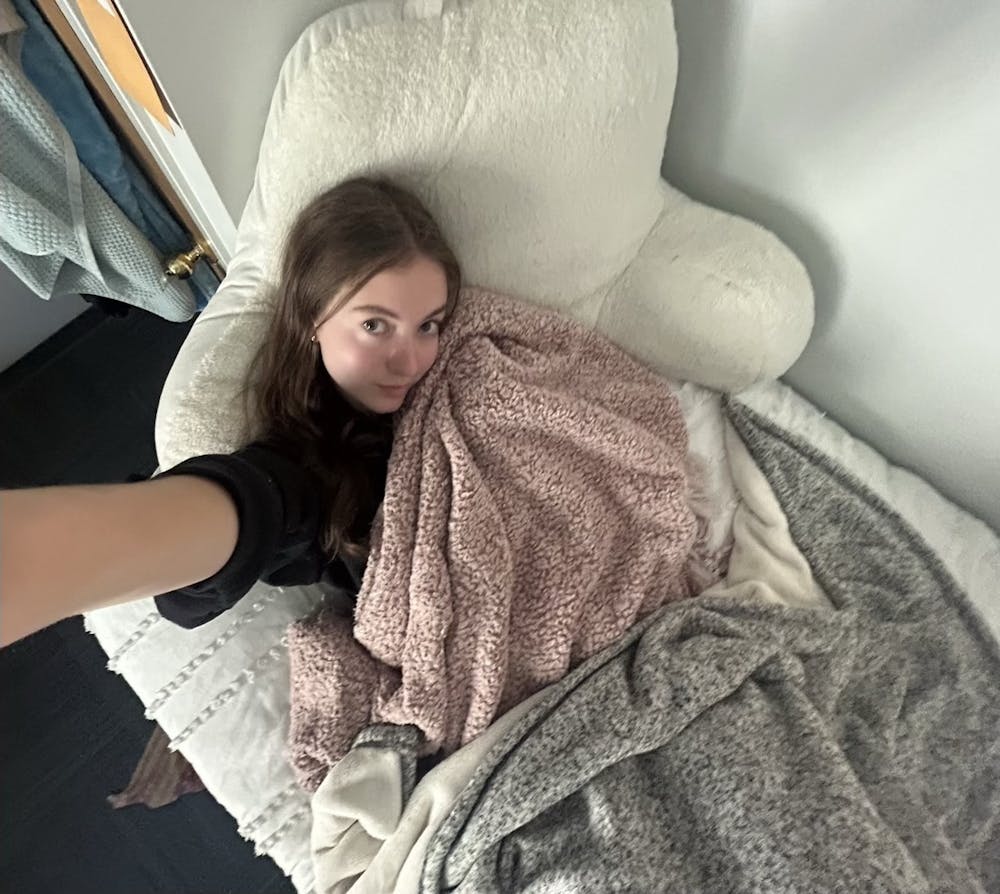
You should all be very proud of me because this week, I only got five hours of sleep. No, not per night: in total! I know, I know. You can hold your applause. This morning, I woke up at 5 a.m. and I ran a half-marathon. Then, I bravely suffered through eight midterms in a row (I got perfect scores on each and every one, a reward for how little I slept, of course). After classes, I did all of my homework and studied for 12 hours, and then I went to my research lab, followed by a volunteering shift for the organization I run, followed by an extremely important GBM for the club that I am the president of. I am the most productive human being on planet Earth. Did I mention how difficult my major is? Did I mention that I didn't have time to eat today? Did I mention how little I've slept this week? Five. Hours. No, not per night. In. Total. Yeah.
I'm sorry you all had to read that. I'm sure you've heard this speech at least once today already, but I could talk for the combined amount of hours you all slept last night about how much I hate "struggle culture" at Hopkins.
You have heard of this social phenomenon under its many aliases and euphemisms: hustle-culture, the "grindset," "locking in." You have seen it in dark circles and chain-smoked Redbull and the smell of stressed-out, unshowered, over-caffeinated library hibernators. You will witness many Hopkins students brag about their GPA on Linkedin, but you will seldom hear them boast about how well-rested they are and how fulfilled and at peace they feel with their lives.
There is nothing inherently dark or toxic about the girl who has signed up for too many student orgs, the boy who wins a new prestigious award every week, the person who consistently sets the curve in your most difficult class. What is dark and toxic — and scarier than any horror movie you may watch this month — is how we talk about these hectic schedules in the language of prideful struggle.
Struggle Culture builds a society in which we are praised for our sacrifice: giving up meals, sleep, relationships and our mental health in favor of a perceived sense of accomplishment. We are proud to be ranked 6th among national universities in terms of academics and 5th in terms of universities with the most depressed student bodies. Why is this something we laugh about, brag about, even? Why don't we find this as sickening as we should?
After struggling to balance schoolwork and my mental health in high school, I came to college determined to prioritize my happiness over any sort of academic or professional accomplishment. This started out quite successfully, as I found myself increasingly able to stay away from toxic work culture and spend more time sleeping, hanging out with friends and pursuing hobbies that filled me with joy and were not at all aligned with my future career goals.
Although I always managed to turn in my calculus problem sets before midnight, I did not let something as trivial as the subject of calculus (sorry to my AMS friends) distract me from my true loves of rotting in bed and FaceTiming my best friend from home and walking in the sunshine and playing my guitar. For a while, I was truly happy. Then, I noticed the Hopkins struggle culture wrapped its cold hands around the neck of my idyllic college life.
It started slowly. Comments from friends that they never saw me doing any homework. Subtle digs at the number of humanities classes I had chosen to take as a pre-med. Proclamations that I only had free time because my major was so very incredibly easy. While these judgments haven't changed my habits, I have noticed that they've taken a toll on my self-esteem. I often catch myself comparing my life to the much busier lives of those around me, thinking of myself as lazier and less ambitious than my classmates and wondering if I could accomplish more if I sacrificed more of my well-being. Do I have too much free time? Am I too happy?
But, my dear Hopkins students, none of these thoughts are true! I am very smart! I am very passionate! There is no such thing as having too much free time or being too happy! I may need more naps than the average human being, but my life is going to turn out just fine. And yours will, too. I pinky promise.
Struggle Culture has created a day-to-day where I constantly need to remind myself that I am "doing enough" and that I am proud of how well I take care of myself and my sanity. When I hear friends or classmates launch into self-deprecating, humble brags about how little they are sleeping and eating and leaving their rooms and how naturally this will translate into med school or grad school or job market success, I stop and remind myself: Oh! They are playing the struggle game! And you know what? I'm going to let them win. Every. Single. Time.
If you are a Hopkins student struggling with The Struggle, I want you to know that this article is sincerely not a dig at you. I have been you. I am friends with you, and I am family with you, and I am right here in it with you. I love you. Please grab a snack, please take that break, please go out and do something that could absolutely not be added to your resume. Nothing will pass you by when you stop to take a breath, I promise.
Hailey Finkelstein is a sophomore from Ardsley, New York majoring in Medicine, Science and the Humanities with a concentration in Writing Seminars.





